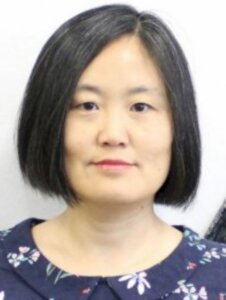Konferencja końcowa – Wykłady plenarne

Weiqin Chen
Universal Design of ICT in Education
Abstract
The rapid increase in the adoption of Information and Communication Technologies (ICT) in education has not only created new opportunities for students with disabilities to enhance their access to education but has also introduced new challenges. Inaccessible digital learning materials and platforms can make it difficult for students to enjoy equitable access and negatively affect their learning outcome. The goal of universal design of ICT in the educational context is to ensure that digital learning resources, tools and platforms are accessible and usable by all users, regardless of their abilities. In this talk, Professor Weiqin Chen will discuss the importance of universal design of ICT in education and share her experiences in evaluating and promoting universal design of digital technologies in higher education. She will conclude her talk with recommendations for further research and practice in enhancing universal design of ICT in education.
Bio
Weiqin Chen is Professor at Department of Computer Science at Oslo Metropolitan University and leader of the research group Universal Design of ICT. She has many years of teaching and research experiences in human computer interaction, assistive technology, and universal design of ICT. Her current research interest is focused on digital accessibility in higher education.

Jenny Liontou
Digital means & language education accessibility to students with Special Educational Needs
Abstract
The need to give equal access to education and make the learning process fruitful for every student, regardless of his/her individual learning abilities and styles, has gained an increased focus of attention by many modern psychologists and educators who have started to explore the impact of different teaching practices on students with Learning Differences (LDs). However, there is still limited information as regards the most efficient FL teaching methodologies and digital tools for learners with Attention Deficit Hyperactivity Disorder (ADHD). The aim of this presentation is to shed light on available digital tools and online instruments while reflecting on their use for FL teaching and assessment purposes of ADHD learners. To this end, a variety of digital resources that can be used to create a more dynamic learning environment and increase ADHD learners’ self-confidence, engagement and motivation will be demonstrated, while issues concerning feedback provision and practical affordances provided by digital technologies will also be discussed. The presentation aspires to yield practical guidance and insight to FL instructors, material developers and curricula designers from primary to tertiary education in reference to specific digital tools and computer-based features that could prove of great benefit to ADHD students in their endeavours to learn a foreign language.
Bio
Jenny Liontou is Assistant Professor at the Department of English Language and Literature of the National and Kapodistrian University of Athens, Greece. Specialising in the area of Applied Linguistics and ELT Methodology, she holds a Ph.D. in English Language & Linguistics with specialization in EFL Testing & Assessment. She holds an M.A. in Lexicography: Theory and Applications and another M.A. with Distinction in Information Technology in Education from Reading University, UK. She has worked as a research assistant and expert item consultant for various national and international examination boards. She has made presentations in national and international conferences and has published papers in the aforementioned fields. Her current research interests include theoretical and practical issues of EFL pedagogy, testing and assessing foreign language competence, digital means and language education accessibility and corpus-based teaching and assessment practices.

Karin Vogt
Universal Design for Learning in Classroom-based Language Assessment
Abstract
In increasingly diverse learner groups, it must be ensured that foreign language learners can reach their full potential, so diverse learner needs have to be catered for both in teaching and in assessment contexts. Providing accessibility of learning, teaching and assessment is a matter of equity and has increasingly been embraced as a principle of foreign language assessment. However, accessibility of language assessment has often been seen as retrospective accommodations rather than a flexible planning of language assessment from the start. The purpose of the presentation is to discuss the potential of Universal Design for Learning (UDL) for classroom-based language assessment (CBLA) procedures. After clarifying relevant terms, the notion of accessibility will be applied to foreign language assessment. UDL as a flexible framework for individualized language learning will be presented and illustrated for a foreign language context before its potential for CBLA is discussed and exemplified.
Bio
Karin Vogt is a professor of Didactics of English Language at the University of Education Heidelberg, Germany. Her research interests include, among others, inclusive foreign language teaching, classroom-based language assessment, intercultural learning, teaching practicums abroad, vocationally oriented language learning, the Common European Framework of Reference for Languages and digital media in the foreign language classroom.

Arnfinn Muruvik Vonen
Making language education accessible to students from diverse backgrounds: Deaf and hard of hearing students
Abstract
The concept of access is crucial in several ways when it comes to language education for deaf and hard of hearing students. Access to a language may be dependent on the extent to which the language is used in a student’s environment, as well as on the extent to which the language is physically accessible to the student. In my presentation, I will discuss issues of access to language in several ways: access to the local sign language, to the family’s home language, to the dominant language of the greater society, and to international and other languages (spoken/written and signed), as well as access to bilingual, multilingual and translanguaging approaches to education. In addition to international research on language acquisition and language education, I will draw on experiences from legislation and practice, primarily from Norway.
Bio
Arnfinn Muruvik Vonen (born 1960) is a general linguist and a professor in the Department of International Studies and Interpreting at OsloMet – Oslo Metropolitan University. His teaching is mainly on sign language linguistics and communication theory. Earlier, he has been a professor and the head of department in the Department of Special Needs Education at the University of Oslo, and he has been the director general of the Norwegian Language Council. His research interests include a wide range of topics including the grammar of Norwegian Sign Language, the education of deaf and hard of hearing students, and language policy and planning.
